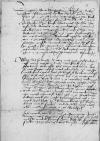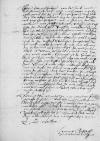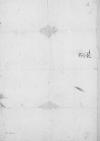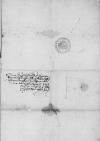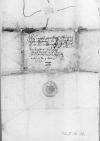Mir ist Ewer Gnaden cf. Albrecht I von Hohenzollern-Ansbach to Ioannes DANTISCUS Königsberg, 1532-08-29, CIDTC IDL 821⌊cf. Albrecht I von Hohenzollern-Ansbach to Ioannes DANTISCUS Königsberg, 1532-08-29, CIDTC IDL 821⌋ eigener hant vonn Cracow (Kraków, Cracovia), city in southern Poland, Małopolska, on the Vistula river, from 1038 capital of the Kingdom of Poland⌊KrakoCracow (Kraków, Cracovia), city in southern Poland, Małopolska, on the Vistula river, from 1038 capital of the Kingdom of Poland⌋ durch meynn sundrenn freundt und bruder, hernnn Nikolaus Nibschitz (Mikołaj Nipszyc) (*ca. 1483 – †1541), royal courtier, diplomat in the service of Sigismund I and Albrecht von Hohenzollern-Ansbach, Dantiscus' friend; from 1525 until his death an official representative of Duke Albrecht at the Cracow royal court; from 1532 royal secretary; 1519 royal envoy to Albrecht von Hohenzollern, Grand Master of the Teutonic Order, 1525, 1526 envoy to Hungary, 1527 envoy to the Congress in Wrocław, 1531-1533, 1537 envoy to Ferdinand I of Habsburg, 1535-1537, 1540 envoy to Brandenburg, 1536 envoy to the estates of Livonia⌊NibschiczennNikolaus Nibschitz (Mikołaj Nipszyc) (*ca. 1483 – †1541), royal courtier, diplomat in the service of Sigismund I and Albrecht von Hohenzollern-Ansbach, Dantiscus' friend; from 1525 until his death an official representative of Duke Albrecht at the Cracow royal court; from 1532 royal secretary; 1519 royal envoy to Albrecht von Hohenzollern, Grand Master of the Teutonic Order, 1525, 1526 envoy to Hungary, 1527 envoy to the Congress in Wrocław, 1531-1533, 1537 envoy to Ferdinand I of Habsburg, 1535-1537, 1540 envoy to Brandenburg, 1536 envoy to the estates of Livonia⌋, zu komenn, / das mich herczlich hot erfreudt, / daraus Ewer Gnaden gnedigenn, freuntlichennn willenn gen mir / vorstandenn / mit solchen erbittennn, / das ich ummb Ewer Gnaden nye hab vorschuldet / noch vordynet. / Bedanck mich der halbenn gen Ewer Gnaden uff das allerhochste, / wil ouch solcher grosser, unvordinter freuntschaff, / dar in mich Ewer Gnaden genomenn, / nummer undanckpar gefundenn werdenn, / und das wirt mit der zceit Ewer Gnaden uffentlich spurenn unnd befindenn etc.
Was das belangt, / do von mir Ewer Gnaden geschribennn, / uff meinn negstenn cf. Ioannes DANTISCUS to Albrecht I von Hohenzollern-Ansbach Cracow, 1532-08-16, CIDTC IDL 5184⌊cf. Ioannes DANTISCUS to Albrecht I von Hohenzollern-Ansbach Cracow, 1532-08-16, CIDTC IDL 5184⌋ vonn Cracow (Kraków, Cracovia), city in southern Poland, Małopolska, on the Vistula river, from 1038 capital of the Kingdom of Poland⌊KrakoCracow (Kraków, Cracovia), city in southern Poland, Małopolska, on the Vistula river, from 1038 capital of the Kingdom of Poland⌋ an Ewer Gnaden gegebennn, / bedorffte einn lang antwurt, / das so mit papir nicht wol oder sicher ist auszurichtennn. / Wil das selbtige so berhwenn lossenn, biss ich selbst mich zu Ewer Gnaden mag vorfuegennn / und do mit Ewer Gnaden willenn unnd meynemm hochemm beger genug muge geschenn. / So ich mich vonn hynnenn zu der Provincial Diet of Royal Prussia ⌊tagfartProvincial Diet of Royal Prussia ⌋ uff sant Michel genn Marienburg (Malbork), town and castle in northern Poland, Pomeranian Voivodeship, on the Nogat river, a branch of the Vistula at its delta, the capital of the Grand Masters of the Teutonic Order in Prussia (1309-1457), a voivodeship capital in Royal Prussia, which belonged to the Kingdom of Poland (1466-1772). Marienburg (taking turns with Graudenz (Grudziądz)) was the venue for the Provincial Diets of Royal Prussia, which were chaired by the bishop of Ermland (Warmia)⌊MarienburgMarienburg (Malbork), town and castle in northern Poland, Pomeranian Voivodeship, on the Nogat river, a branch of the Vistula at its delta, the capital of the Grand Masters of the Teutonic Order in Prussia (1309-1457), a voivodeship capital in Royal Prussia, which belonged to the Kingdom of Poland (1466-1772). Marienburg (taking turns with Graudenz (Grudziądz)) was the venue for the Provincial Diets of Royal Prussia, which were chaired by the bishop of Ermland (Warmia)⌋ mues begeben / und vonn dannenn straks aus ein andernn weg vor mich nhemenn, / thu ich Ewer Gnaden hochlich bittenn, wold sich nicht besverenn, / das ich Ewer Gnaden noch demm tage zu Marienburg / zu Riesenburg (Prabuty), town in northern Poland, Pomerania, 44 km NE of Graudenz⌊ResenburgRiesenburg (Prabuty), town in northern Poland, Pomerania, 44 km NE of Graudenz⌋ mocht findenn / und do selbst mich noch aller nottorfft mit Ewer Gnaden beredenn.
Ich wold gernn Ewer Gnaden vil gutter, newer zceytungenn vonn hynnenn schreibenn. / So ist an mich nichts anders komenn, / dan das der hern The Fuggers German family of merchants and bankers that dominated European business during the 15th and 16th centuries⌊FuggerThe Fuggers German family of merchants and bankers that dominated European business during the 15th and 16th centuries⌋ factor Georg Mülich From 1509 Fuggers' factor in Milan, Wrocław (Ger. Breslau) and Toruń (Ger. Thorn). (Reinhard W., Häberlein M., Augsburger Eliten des 16. Jahrhunderts: Prosopographie wirtschaftflicher und politischer Führungsgruppen 1500-1620, 1996)⌊Jorg MulichGeorg Mülich From 1509 Fuggers' factor in Milan, Wrocław (Ger. Breslau) and Toruń (Ger. Thorn). (Reinhard W., Häberlein M., Augsburger Eliten des 16. Jahrhunderts: Prosopographie wirtschaftflicher und politischer Führungsgruppen 1500-1620, 1996)⌋ vonn Wrocław (Breslau, Vratislavia), city in southwestern Poland, on the Oder river, historical capital of Silesia, from 1526 ruled by the Habsburgs⌊BreslaWrocław (Breslau, Vratislavia), city in southwestern Poland, on the Oder river, historical capital of Silesia, from 1526 ruled by the Habsburgs⌋ negst gennn Thorn (Toruń, Thorunium), city in northern Poland, on the Vistula river in its lower reaches, main residence of the bishops of Kulm (Chełmno); one of the three Great Prussian Cities (along with Gdańsk and Elbing) which had representatives in the Council of Royal Prussia; a member of the Hanseatic League⌊ThornnThorn (Toruń, Thorunium), city in northern Poland, on the Vistula river in its lower reaches, main residence of the bishops of Kulm (Chełmno); one of the three Great Prussian Cities (along with Gdańsk and Elbing) which had representatives in the Council of Royal Prussia; a member of the Hanseatic League⌋ hot geschribenn, / wie der The Ottoman Turks (Turcae) ⌊TurkThe Ottoman Turks (Turcae) ⌋ mit al seiner gewalt / acht meil wegs noch Hungary (Kingdom of Hungary)⌊HungernnHungary (Kingdom of Hungary)⌋ sey zu ruckenn geczogenn / und hab das stettlenn Güns (Köszeg, Guncium), town and fortress in northwestern Hungary on the border with Austria⌊GunsGüns (Köszeg, Guncium), town and fortress in northwestern Hungary on the border with Austria⌋, / das der probably İbrahim Pasha (*ca. 1493 – †1536), in 1536 the Sultan, worried about his growing importance, had him strangled and confiscated his property; 1523-1536 Grand Vizier and Serasker (supreme commander of the army) of Sultan Suleiman I and his trusted advisor (AT 16/1, No. 147, p. 286-295; CLOT 2012, p. 94-98; DZIUBIŃSKI, p. 104-106, 112-114; POCIECHA 4, p. 192)⌊Imbrey Basschaprobably İbrahim Pasha (*ca. 1493 – †1536), in 1536 the Sultan, worried about his growing importance, had him strangled and confiscated his property; 1523-1536 Grand Vizier and Serasker (supreme commander of the army) of Sultan Suleiman I and his trusted advisor (AT 16/1, No. 147, p. 286-295; CLOT 2012, p. 94-98; DZIUBIŃSKI, p. 104-106, 112-114; POCIECHA 4, p. 192)⌋ vil tag het belegert / und V. sturme dar vor verlorenn, / mit solchenn tedingenn gelossenn. / Ins erst liss her durch eynn basscha mit demm houptman des Güns (Köszeg, Guncium), town and fortress in northwestern Hungary on the border with Austria⌊stettlensGüns (Köszeg, Guncium), town and fortress in northwestern Hungary on the border with Austria⌋, eynemm tapferenn manne, redennn, das her sich im in sein dinst ergebe, / wold im das stettlen und ander herummer erblich gebenn. Und do her dissenn wedlichenn houptmann dar zu nicht mocht bringenn, / do mit mit ehrennn die belegrung abzcuge, / liss her mit im handlenn, / so Vienna (Wien, Vienna), city in eastern Austria, on the Danube river⌊WienVienna (Wien, Vienna), city in eastern Austria, on the Danube river⌋ gewonnenn wurd, / das her sich ouch ergebe. / Hiruff, / so der houptmann keinn pulver mher und weynig gehabt profant, / hot sich lossenn beredenn / wissende, das Vienna (Wien, Vienna), city in eastern Austria, on the Danube river⌊WienVienna (Wien, Vienna), city in eastern Austria, on the Danube river⌋ so mit aller nottorfft besorget, das es diss jor bleib ungewonnenn. / Und wie der schreibt, / das die The Ottoman Turks (Turcae) ⌊TurkennThe Ottoman Turks (Turcae) ⌋ kein slacht wollenn geliffernn, / des ich mich alzeit besorget. / Idoch hab ich vonn Charles V of Habsburg (*1500 – †1558), ruler of the Burgundian territories (1506-1555), King of Spain as Charles I (1516-1556), King of Naples and Sicily, King of the Romans (1519-1530), Holy Roman Emperor of the German Nation (elected 1519, crowned 1530, abdicated 1556); son of Philip I the Handsome and Joanna the Mad of Castile⌊kayserlicher maiestetCharles V of Habsburg (*1500 – †1558), ruler of the Burgundian territories (1506-1555), King of Spain as Charles I (1516-1556), King of Naples and Sicily, King of the Romans (1519-1530), Holy Roman Emperor of the German Nation (elected 1519, crowned 1530, abdicated 1556); son of Philip I the Handsome and Joanna the Mad of Castile⌋ und vomm Ferdinand I of Habsburg (*1503 – †1564), from 1521 Archduke of Austria, from 1526 King of Bohemia and Hungary, Croatia and Slavonia as Ferdinand I, 1531-1558 King of the Romans, 1558-1564 Holy Roman Emperor; son of Philip I the Handsome and Joanna the Mad of Castile, a younger brother of Charles V of Habsburg⌊romschenn konigeFerdinand I of Habsburg (*1503 – †1564), from 1521 Archduke of Austria, from 1526 King of Bohemia and Hungary, Croatia and Slavonia as Ferdinand I, 1531-1558 King of the Romans, 1558-1564 Holy Roman Emperor; son of Philip I the Handsome and Joanna the Mad of Castile, a younger brother of Charles V of Habsburg⌋ gehort, / so die The Ottoman Turks (Turcae) ⌊TurkennThe Ottoman Turks (Turcae) ⌋ der slacht sich woldenn enczyhenn, / das sie mit aller macht woltenn noch seczenn. / Got gebe glug uff unser seittenn etc.
Hiermit thu ich mich in Ewer Gnaden gnedige freuntschafft befelenn / und bit, mich wold mit denn ersten lossenn wissenn, / voczu das Ewer Gnaden gewilliget ist. / Got der almechtig geb Ewer Gnaden ein gesunt, langwerig lebenn und zu allennn zceitenn glugszelig zunhemenn.
